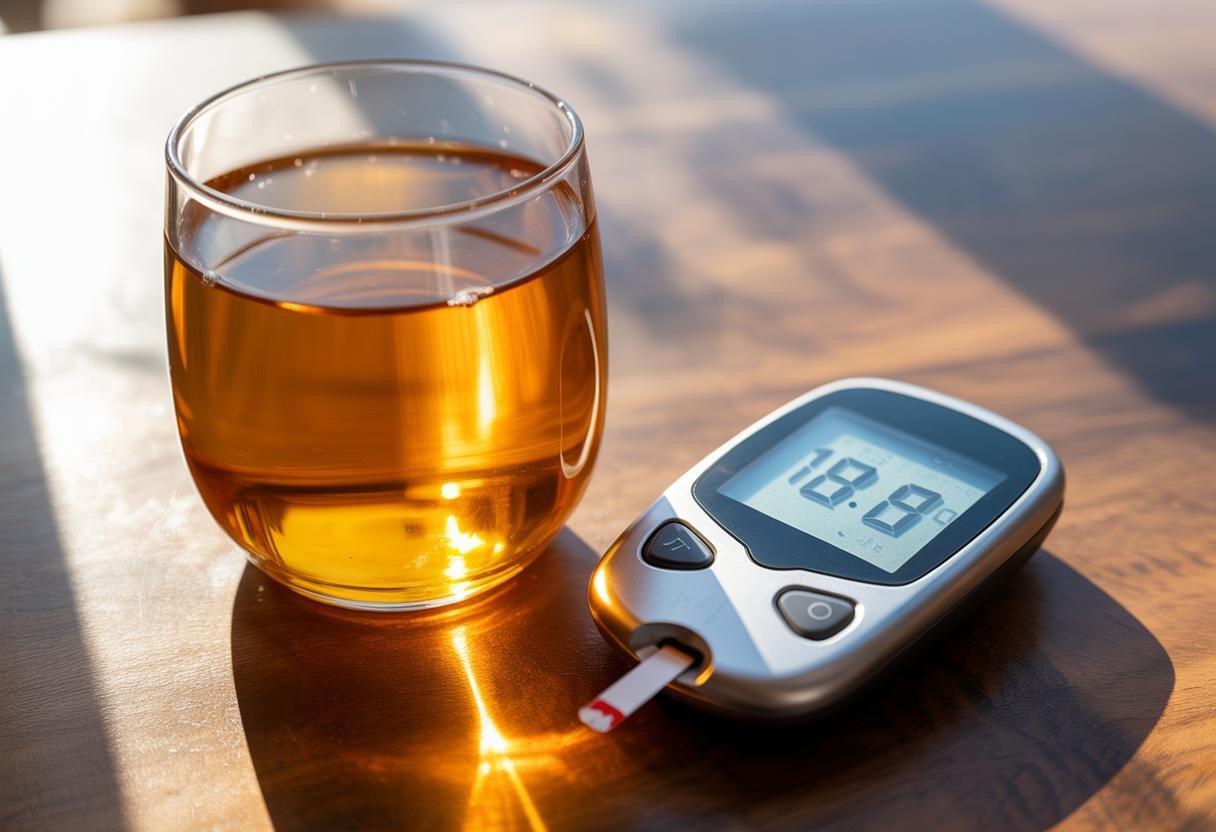Taking one to two tablespoons of apple cider vinegar daily could reduce your fasting blood sugar by an average of 22 mg/dL and lower your HbA1c by 1.5 percentage points, according to recent meta-analyses examining its effects on insulin sensitivity. What makes this fermented liquid particularly intriguing is how it works through multiple metabolic pathways that most people never consider.
Unlike quick-fix supplements that promise overnight transformations, apple cider vinegar’s impact on blood sugar control operates through scientifically validated mechanisms that researchers have been studying for over two decades.
The hidden science behind vinegar’s metabolic power
Apple cider vinegar doesn’t just randomly lower blood sugar—it orchestrates a complex dance of metabolic processes that begin the moment it hits your digestive system. The acetic acid in ACV inhibits specific enzymes called disaccharidases, which are responsible for breaking down complex carbohydrates into simple sugars.
This enzymatic suppression means your body absorbs glucose more slowly, preventing those dramatic blood sugar spikes that can occur after meals. But the benefits extend far beyond simple carbohydrate blocking.
“The most fascinating aspect is how acetic acid activates AMPK pathways in muscle tissue,” explains Dr. Sarah Chen, an endocrinologist studying natural insulin sensitizers. “This activation promotes GLUT4 translocation, essentially opening more doors for glucose to enter muscle cells where it belongs.”
Why timing and dosage create dramatically different results
The bedtime advantage most people miss
While many consume ACV before meals, emerging research suggests that bedtime consumption may offer superior glucose control benefits. A 2024 study found that taking diluted apple cider vinegar before sleep improved overnight glucose regulation and morning fasting levels more effectively than pre-meal timing.
The delayed gastric emptying effect works synergistically with your body’s natural circadian rhythm, enhancing incretin hormone secretion during the crucial overnight metabolic reset period.
The dose response relationship
Research reveals a clear pattern: each additional milliliter of daily ACV consumption correlates with a 1.25 mg/dL reduction in fasting blood sugar. However, benefits plateau around 30 mL daily, suggesting that more isn’t necessarily better.
Interestingly, people with existing insulin resistance showed more pronounced improvements compared to metabolically healthy individuals, indicating that ACV’s effects are most notable in those who need it most.
Comparing vinegar to other natural insulin sensitizers
When stacked against other natural compounds, apple cider vinegar holds its own remarkably well. While these 5 kitchen spices that reduce blood sugar by 27 mg/dL offer comparable benefits, ACV’s advantage lies in its multiple mechanisms of action.
Unlike single-pathway interventions, vinegar simultaneously affects digestion, gastric emptying, muscle glucose uptake, and potentially gut microbiota composition. This multi-target approach may explain why combining ACV with other interventions like fermented foods that reduce liver inflammation by 40% could create synergistic metabolic benefits.
Critical implementation guidelines for optimal results
Safety protocols that prevent common mistakes
The biggest error people make is consuming undiluted ACV, which can erode tooth enamel and irritate the esophagus. Always dilute 15-30 mL in at least 8 ounces of water and consider using a straw to minimize dental contact.
Individuals with kidney disease should avoid ACV entirely, as the acidity can exacerbate existing nephrotoxicity. Those taking insulin or diabetes medications need medical supervision to prevent hypoglycemic episodes.
Maximizing absorption and effectiveness
Start with 5-10 mL daily and gradually increase to assess tolerance. The “mother” (cloudy sediment) in unfiltered ACV contains additional beneficial compounds, though filtered versions retain the primary active ingredient, acetic acid.
Avoid consuming ACV immediately after meals high in processed foods or artificial sweeteners, as diet soda reduces beneficial gut bacteria by 25%, potentially counteracting ACV’s positive gut microbiota effects.
The bigger picture beyond blood sugar
While the insulin sensitivity benefits are compelling, apple cider vinegar represents just one piece of a comprehensive metabolic health strategy. The modest but consistent improvements in fasting glucose and HbA1c levels make it a valuable adjunct to—not replacement for—proven lifestyle interventions like regular exercise, fiber-rich nutrition, and stress management.
Remember that sustainable metabolic health comes from consistent, evidence-based practices rather than searching for single miracle solutions.
